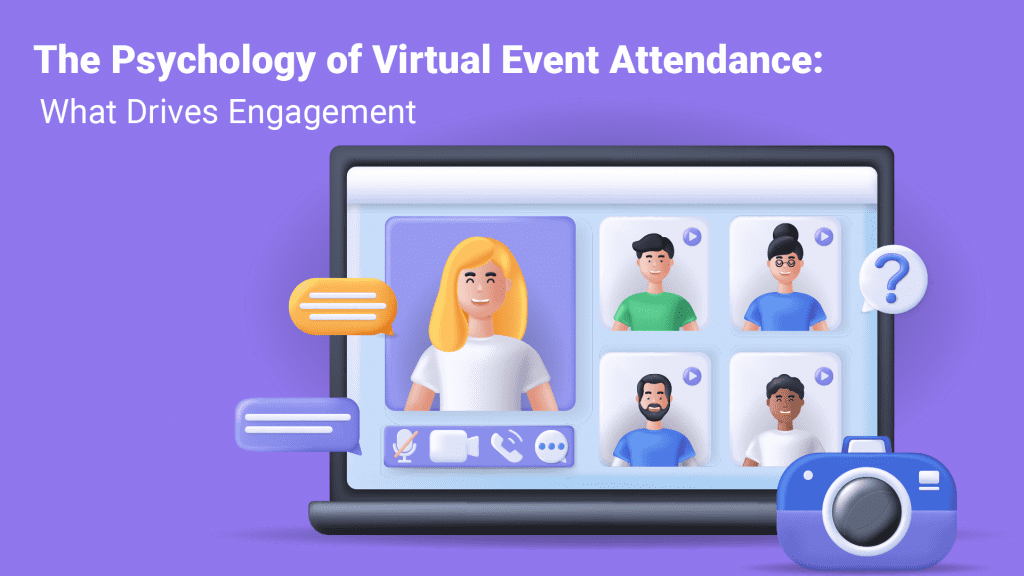
Discover the fascinating psychology behind virtual event attendance and uncover the key factors that drive engagement. Gain insights into the motivations and behaviours of event attendees. Explore the impact of virtual environments on participant engagement.
In the rapidly evolving realm of digital interaction, virtual events have emerged as a crucial platform for engagement, networking, and knowledge-sharing. The shift from in-person gatherings to virtual experiences has been expedited by technological advancements and, more recently, the global pandemic.
Grasping the psychology behind virtual event attendance is essential for event organizers to enhance engagement and deliver a rewarding virtual experience for participants.
Read the blog carefully to learn more to understand the psychology behind Virtual Event Attendance, and you will also get to know about the factors that fuel engagement.
Unveiling the Psychological Dynamics of Virtual Event Participation: What Keeps Attendees Engaged
Enhanced Convenience and Accessibility
Virtual events offer unparalleled convenience and accessibility. Individuals can attend from the comfort of their homes or offices, eliminating geographical barriers and reducing the time and cost associated with travelling to physical venues. This ease of access significantly boosts attendance rates, appealing to a broader audience base.
The psychology at play here is rooted in the human desire for convenience and efficiency. People are naturally inclined to choose the path of least resistance, and virtual events perfectly align with this inclination. The ease of logging in from a device and instantly becoming part of an event is a powerful motivator for increased attendance and engagement.
Achieving Cost Efficiency and Affordability
Attending physical events often involves considerable costs, including registration fees, travel, accommodation, and meals. Virtual events, on the other hand, are often more cost-effective or even free to attend. This aspect attracts a wider demographic, including individuals who might not have been able to afford or justify the expenses associated with in-person events.
The psychology behind this is straightforward: individuals are more likely to engage with opportunities that are financially accessible. Lower barriers to entry make it easier for people to commit to participation, leading to higher attendance and engagement rates.
Content That is Diverse & Tailored
Virtual events can offer a diverse range of content to cater to various interests, industries, and expertise levels. From keynote speeches and panel discussions to interactive workshops and networking sessions, attendees have the flexibility to choose sessions that align with their preferences and professional goals. This customization ensures that participants are more likely to stay engaged throughout the event.
Psychologically, this customization appeals to the basic human need for autonomy and relevance. When attendees can personalize their event experience, they feel more valued and engaged, resulting in a positive perception of the event and an increased likelihood of continued participation.
Reduced Social Anxiety and Enhanced Networking
For some individuals, especially introverts or those struggling with social anxiety, virtual events provide a comfortable setting to interact with others. The online environment allows for controlled communication, enabling individuals to network and engage at their own pace without the pressure of face-to-face interactions.
The psychology here revolves around the reduction of social barriers. When attendees feel less intimidated or anxious about engaging with others, they are more likely to actively participate, contribute to discussions, and establish meaningful connections during the event.
Global Reach and Exposure
Virtual events break down geographical boundaries, allowing organizers to reach a global audience. This broad reach enhances exposure for speakers, sponsors, and exhibitors, and it also provides attendees with the opportunity to connect with a diverse community of professionals from different parts of the world.
The psychological aspect is the inherent curiosity and interest in understanding different cultures, perspectives, and experiences. Virtual events facilitate this curiosity by enabling individuals to engage with a diverse array of people, enriching their knowledge and widening their worldview.
Integration of Gamification and Interactivity
Many virtual events incorporate gamification elements and interactive features to keep attendees engaged and motivated. These can include quizzes, challenges, virtual booths, and networking games. By introducing an element of competition or encouraging active participation, organizers tap into the human desire for excitement and rewards.
Psychologically, gamification triggers the release of dopamine, a neurotransmitter associated with pleasure and motivation. When attendees experience this positive reinforcement during a virtual event, they are more likely to stay engaged and return for future events.
Opportunities for Skill Enhancement and Learning
Virtual events often offer a rich source of educational content, from expert talks to skill-building workshops. Attendees view virtual events as a platform to enhance their knowledge, acquire new skills, and stay updated with industry trends—all from the convenience of their own space.
The psychology behind this is deeply ingrained in the human thirst for growth and development. When attendees perceive an event as an opportunity to invest in their personal or professional growth, their motivation to engage and derive value from the event amplifies significantly.
Desire for Connection and Community
Despite the digital nature of virtual events, attendees often seek a sense of connection and community. Virtual event platforms integrate features like chat rooms, discussion forums, and social media integration, allowing participants to engage with each other, share insights, and build relationships.
Psychologically, humans are social beings; they thrive on connections and a sense of belonging. Virtual events, through their community-building efforts, tap into this fundamental need for human interaction, resulting in enhanced engagement and a positive event experience.
Flexibility and Time Management
Virtual events provide a high degree of flexibility in scheduling and participation. Attendees can choose sessions that align with their schedules and commitments, allowing them to balance personal and professional responsibilities. This flexibility is a powerful motivator, as it ensures that individuals can engage with the event without feeling overwhelmed or stressed.
Psychologically, flexibility resonates with the human need for autonomy and control over one’s time. When attendees can manage their event experience according to their availability, they feel more empowered and inclined to engage actively, resulting in a positive perception of the virtual event.
Sustainability and Environmental Consciousness
In an era where environmental sustainability is a growing concern, virtual events align with the values of many individuals who prioritize eco-friendliness. By opting for a virtual event, attendees reduce their carbon footprint associated with travel and physical event logistics. This alignment with sustainability values can be a significant driving factor for engagement.
The psychology underlying this point is based on the human desire to contribute to a sustainable future. When attendees perceive their participation in a virtual event as a step towards environmental responsibility, they feel a sense of fulfilment and alignment with their values, motivating them to actively engage and support similar events in the future.
Final Words
Understanding the psychology that drives engagement in virtual events is paramount for event organizers. By recognizing and catering to fundamental human needs and desires, organizers can optimize virtual event experiences, resulting in higher attendance, increased engagement, and long-term participant satisfaction.
As technology continues to advance and virtual events become increasingly sophisticated, a deeper understanding of the psychology behind attendee engagement will be pivotal in shaping the future of virtual events.





